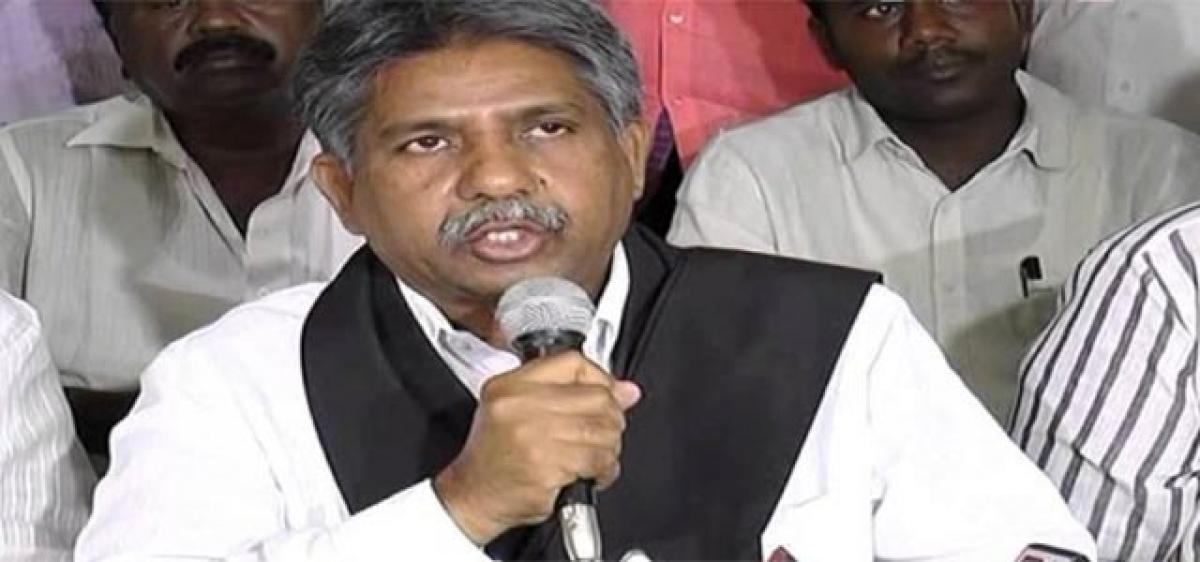Live
- TTD EO inspects Tiruchanoor Brahmotsavam arrangements
- Crisis grips Davanagere farmers despite bumper crop
- NSU probes drug use incident
- Yathindra Siddaramaiah’s statement on judiciary sparks petition for contempt of court
- Initiate steps for implementation of GER: Minister Anam
- Mammootty and Mohanlal to Team Up for Their 50th Film Together
- CAG points out increasing debts during 2022-23
- Youth Commits Suicide in Srikalahasti
- MeT department advises TN fishermen to avoid deep sea fishing
- Scientists decode brain activity that can help treat anxiety and depression
Just In

The long-pending demand for categorisation of Scheduled Castes has once again gained momentum with the increasing number of political parties coming openly in support of the demand.
The long-pending demand for categorisation of Scheduled Castes has once again gained momentum with the increasing number of political parties coming openly in support of the demand. The Scheduled Castes and Scheduled Tribes also have social hierarchy. This results in appropriation of benefits of reservation by certain communities to the detriment of others. Thus is the demand for Scheduled Caste categorisation to ensure a just and equitable sharing of reservation benefits. The constitutional philosophy of reservations as a means of positive discrimination is intended at benefitting the most oppressed.
The Supreme Court judgement in EV Chinnaiah vs State of AP landed the vexed question of justice for Dalits among Dalits into a protracted legal rigmarole, political tangle and unfortunate social schism among the oppressed. In this verdict, the apex court was of the view that the State legislature has no legal competence to decide on the apportioning of reservations made to Scheduled Castes and Scheduled Tribes to sub-groups within. Thus the issue went out of the frying pan into the fire. Political parties display ugly spectacle of pusillanimous politics. All parties support the subdivision of SC quota but do not come forward to make an enactment to amend the relevant Constitutional provisions to effect such a division of reservations among the sub-groups within the SCs.
The question is not juristic. It’s a social question. The Scheduled Castes are the lowliest of the lowliest. Yet, they also have social hierarchy. It’s therefore a social misrepresentation to argue that SCs constitute an indivisible social formation that does not allow categorisation. As the noted human rights activist late K Bala Gopal pointed out, the inter se classification is sought not between individuals among Scheduled Castes but between clearly demarcated sub-groups. These are separate castes, have separate names, sometimes separate traditional occupations and separate cultural practices. They do not inter-marry and the higher among them do not normally inter-dine with the lower.
The Article 16(4) of the Constitution says, “Nothing in this Article shall prevent the State from making any provision for the reservation of appointments or posts in favour of any backward class of citizens which, in the opinion of the State, is not adequately represented in the services under the State.” This reveals that the constitutional scheme of reservations as a positive discrimination mechanism is based on the philosophy of providing equal justice by correcting the imbalances in education and employment. Therefore, if a section of a class enjoys disproportionate benefits to the detriment of the others, categorisation of the class is justified in accordance with the spirit of the Constitution itself.
The categorisation of SCs does not take away the benefit of reservations from anyone by sub-grouping. The categorisation is not an act of exclusion through application of creamy layer. Instead, it is only sought to be a remedy to deprivation of reservation for one group as the other disproportionately enjoys. If the law or the jurisprudence fails to acknowledge a social reality, the democratic rule of law gets derailed. Therefore, law has to appreciate and acknowledge the social reality. The demand for categorisation of SCs makes eminent sense. It’s high time that the political system shun its hypocrisy.

© 2024 Hyderabad Media House Limited/The Hans India. All rights reserved. Powered by hocalwire.com







